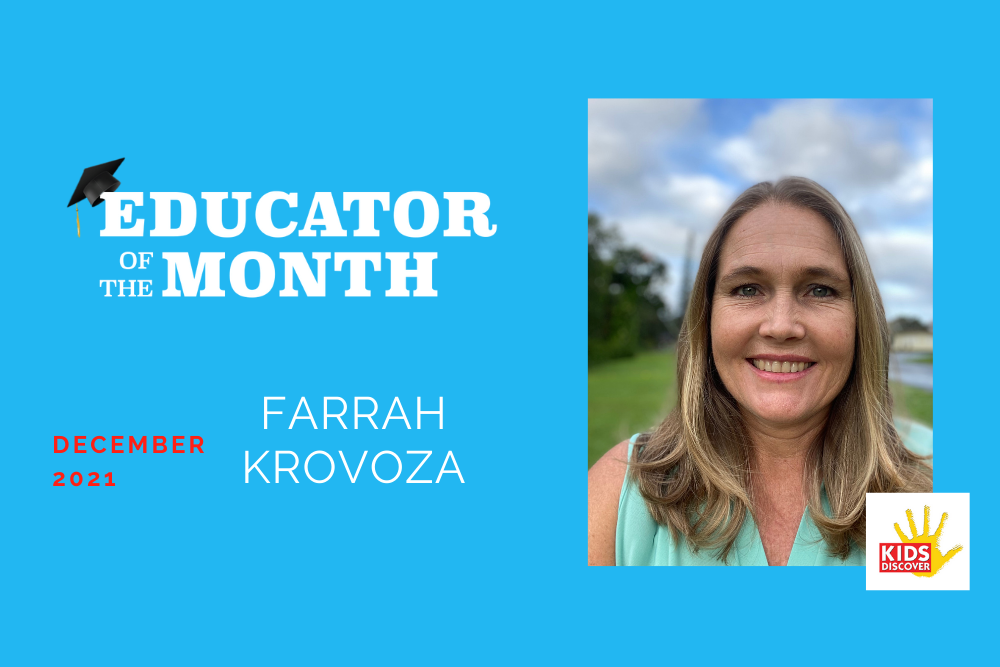Educator of the Month: Farrah Krovoza
- December 17, 2021
- By KIDS DISCOVER
Kids Discover loves our teachers! We are continuing our goal to honor the amazing educators within our community with another installment of Educator of the Month. For December, I’m so happy to introduce Farrah Krovoza, a 5th Grade teacher from Kilauea, Hawaii.

What has your teaching career looked like?
A long, windy, dusty road. Just kidding, lol. I started teaching in Southern CA, as a substitute for one year because I wasn’t able to find a full time position (2002-2003). Then I moved back to Hawaii (where I’m from), and have been teaching in the same classroom for 18 years at the school I attended in elementary, teaching mostly 5th grade, with a few years of 4th and 6th scattered in there.
Where do you teach now and what grade/subject?
I teach at Kilauea Elementary School, where I started in 2004, in 5th grade. I teach all subjects.
How has your teaching experience changed in recent years?
Teaching is ever evolving, constantly swinging from one pendulum to another, not just back and forth, but up, down, and every which way. At times, I actually feel like I was a “better” teacher in the early years, when I was younger, had more creative ideas, and actually felt like I could do what I wanted in my class. Now, with strict testing mandates and pressures, I often feel very boxed in, like I simply can’t do it all. Teachers are required to wear so many hats that it is overwhelming. And most recently, the increase in technology in the classroom and students 1-1 on devices has created a whole new shift and challenge to balance the positive impacts of technology, while not losing the face to face connections, which is what I believe is at the heart of teaching. We can’t sacrifice developing relationships and supporting our students’ social emotional needs, simply because of the convenience of putting them on a digital program to learn at school.
When did you add Kids Discover to your classroom routine?
I started using the Kids Discover magazines in my classroom years ago, very nearly at the beginning of my career. I can’t remember how I discovered them, maybe a catalog had been sent to my school, but I ordered the actual magazines and used them in my classroom. I still have them today. In March of 2020, as the world was panicking about the onset of Covid-19, and schools were scrambling to figure out how to educate their students during the onset of a world pandemic, I saw an ad for the Kids Discover online component, and they were offering teachers a free subscription, so I jumped on that to add to my virtual teaching plan. Once we got back to the in-person learning, I still saw it as a valuable resource and kept it up.
How has Kids Discover impacted your students?
By assigning the Kids Discover online lessons, it helps to build my students’ background knowledge of the various science and social studies that I teach in class. It has increased their overall knowledge in various subjects, and when we have live discussions in class, they often refer to something that they read in one of the Kids Discover assignments. It helps to give them a frame of reference for our in class lectures, lessons, and projects.
What is your favorite feature or aspect of Kids Discover?
I like that the articles are available in 3 different reading levels, and that it offers reading support for struggling readers. That way, they can still get the important content that they need. I also like that I can reassign the quizzes. High expectations and accountability is something that is very important in my class, so if a student has not shown they understand the content, I can give them another opportunity.
What do you love the most about teaching?
I love seeing students engaged in learning, and watching them progress and improve in their knowledge about the world and themselves. Knowing that I am responsible for leading them through just one small part of their educational journey is something I take extreme pride in.
What are your hopes for the future of education?
My hope for the future of education is that we can return to a student-centered model that focuses on the needs of the students while helping and encouraging them to develop their own strengths and interests. I also hope that there can be stronger and better connections and relationships between administrations and teachers. It continues to baffle me that teachers are rarely engaged in policy making processes, when teachers have the experience and knowledge to drive such measures.